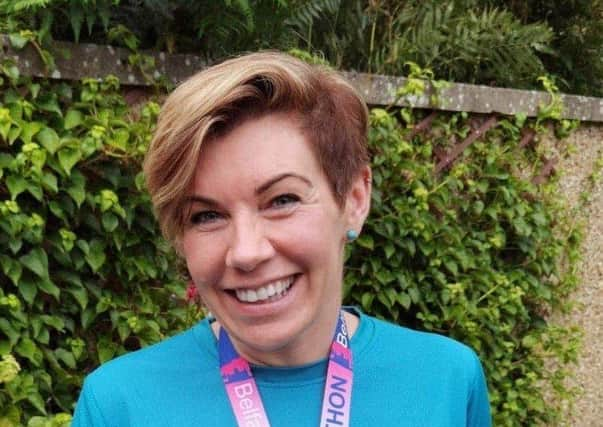Brave Clodagh completes marathon


Clodagh Dunlop from Magherafelt was one of more than 3,500 big-hearted runners and walkers who took part in the marathon event and raised a magnificent £40,000 for cash-strapped Cancer Focus Northern Ireland.
The popular lockdown event was organised by Deep RiverRock Belfast City Marathon to help keep runners and walkers motivated after the annual May bank holiday race was cancelled due to Covid-19.
Advertisement
Hide AdAdvertisement
Hide AdLocal charity Cancer Focus NI, which supports thousands of cancer patients and their families in Northern Ireland each year, is the official race charity partner for 2020.
Runners, walkers and joggers were invited to cover 26.2 miles over a number of days or weeks before June 30. The participants were able to record their times on Garmin or Strava and were rewarded with a virtual race medal. The final times are published on the Belfast City Marathon website.
For Clodagh, the virtual marathon was much more of a journey, after she suffered a devastating stroke in 2015.
She was left trapped inside her own body as a result but has battled against all the odds to return to mobility and has even written an emotionally charged book on her experiences - entitled ‘A Return to Duty’.
Advertisement
Hide AdAdvertisement
Hide AdThe profoundly moving memoir tells the remarkable story of a fighting-fit policewoman from Magherafelt, who was left paralysed and spent three months locked in her body following a devastating stroke.
Clodagh’s life took a dramatic turn when, at the age of 35, she had a brainstem stroke which left her fully conscious but unable to communicate, apart from blinking. She had locked in syndrome, which affects around 1% of people who have a stroke.
It is a condition for which there is no treatment or cure, and it is extremely rare for patients to recover any significant motor functions. About 90% die within four months of its onset.
Although Clodagh does not have full use of her right arm and leg, she has defied her prognosis of spending the rest of her life in a wheelchair.
Advertisement
Hide AdAdvertisement
Hide AdHer determination and hard work also saw her qualify as a detective in the PSNI after returning to the service 18 months after her stroke.
In her latest mission Clodagh decided to take on the challenge of the Belfast Marathon. Taking on the 26.2 miles at walking pace she completed the virtual course in about 10 hours.
She said: “The year I had my stroke I had been due to run the New York Marathon but I was in hospital and couldn’t move.
“A doctor asked me had I ever done the Belfast Marathon and I said no, when the opportunity came up to walk it over a period of time I decided to do it.
Advertisement
Hide AdAdvertisement
Hide Ad“I’ve benefited from what charities offer and I felt I wanted to raise money, particularly at this time as they are not able to raise money in the same way.
“It’s my first marathon since I had my stroke. Although I walked it, it took me over 10 hours.
She said she aims to run a leg of the Belfast Marathon for real at some stage.
Clodagh also revealed the book she published has been selected by the University of Edinburgh as one of just seven texts suitable for young survivors of stroke.
Advertisement
Hide AdAdvertisement
Hide AdClodagh, who has campaigned tirelessly to raise awareness of locked in syndrome and has lobbied government to introduce new legislation to reshape stroke services, says that writing her book was a cathartic experience.
“I always knew I wanted to write my story but it has taken me time to feel ready to talk about some of the very personal aspects of it. I want the world to know the reality of the struggle when you lose the ability to communicate.”